Former Provosts
Although the title has changed through the years, the responsibilities of Purdue’s provosts have remained largely the same. As the University’s chief academic officer, the provost reports directly to the president and is responsible for all academic programs; academic strategy and priorities; faculty-related matters; student life/co-curricular activities; and engagement. In recent years, the provost has taken on the role of chief diversity officer and the development and implementation of programs that contribute to a campus climate of diversity, inclusion and belonging for all members of the Purdue community.
Jay T. Akridge, 2017-2022
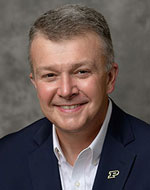 Jay T. Akridge served as provost and executive vice president for academic affairs and diversity, with a faculty appointment as professor of agricultural economics. Akridge was responsible for the academic enterprise with a budget of $1.8 billion, enrollment of over 50,000 students, 2,700 faculty members, and 8,000 staff. He led the development of the Road Map for Transformative Undergraduate Education and Transformative Education 2.0 Next Move initiatives, focused on redefining the residential learning experience. Akridge also led the enrollment growth initiative, boosting undergraduate student rolls to a record 38,000 in 2022 from 31,000 in 2017. Supported by a portfolio of student success initiatives, Purdue’s four-year graduation rate improved to 66% in 2022 under his leadership, up from 59% in 2017. Also during his tenure, Purdue hired 215 faculty members for the 2022-23 academic year — the most ever. He played an integral role as the academic lead for the Protect Purdue strategy during the COVID-19 pandemic, ensuring that Purdue remained safe and open. As Purdue’s chief diversity officer, Akridge co-led the $75 million Equity Task Force, a Purdue Next Move launched in fall 2020 to enhance the representation, experience, and success of Black Boilermakers. Prior to serving as provost, Akridge served as the Glenn W. Sample Dean of Agriculture from 2009-17. He also served as director of the Purdue Center for Food and Agricultural Business from 2000-07, as interim vice provost for engagement at Purdue in 2007-08, and as interim dean of agriculture in 2008-09. He received his master’s degree and PhD in agricultural economics from Purdue and his bachelor’s degree from Murray State University in Murray, Kentucky.
Jay T. Akridge served as provost and executive vice president for academic affairs and diversity, with a faculty appointment as professor of agricultural economics. Akridge was responsible for the academic enterprise with a budget of $1.8 billion, enrollment of over 50,000 students, 2,700 faculty members, and 8,000 staff. He led the development of the Road Map for Transformative Undergraduate Education and Transformative Education 2.0 Next Move initiatives, focused on redefining the residential learning experience. Akridge also led the enrollment growth initiative, boosting undergraduate student rolls to a record 38,000 in 2022 from 31,000 in 2017. Supported by a portfolio of student success initiatives, Purdue’s four-year graduation rate improved to 66% in 2022 under his leadership, up from 59% in 2017. Also during his tenure, Purdue hired 215 faculty members for the 2022-23 academic year — the most ever. He played an integral role as the academic lead for the Protect Purdue strategy during the COVID-19 pandemic, ensuring that Purdue remained safe and open. As Purdue’s chief diversity officer, Akridge co-led the $75 million Equity Task Force, a Purdue Next Move launched in fall 2020 to enhance the representation, experience, and success of Black Boilermakers. Prior to serving as provost, Akridge served as the Glenn W. Sample Dean of Agriculture from 2009-17. He also served as director of the Purdue Center for Food and Agricultural Business from 2000-07, as interim vice provost for engagement at Purdue in 2007-08, and as interim dean of agriculture in 2008-09. He received his master’s degree and PhD in agricultural economics from Purdue and his bachelor’s degree from Murray State University in Murray, Kentucky.
2014-2017: Debasish “Deba” Dutta
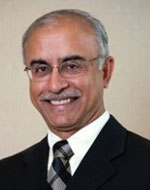 Debasish (Deba) Dutta served as provost and executive vice president for academic affairs and diversity with a faculty appointment as professor of mechanical engineering. During his tenure at Purdue, he oversaw the growth of the College of Engineering and programs within computer science, business and nursing, as well as the transformation of the Purdue Polytechnic Institute. Dutta established the Advisory Committee on Diversity and Inclusion, ensuring that all voices are represented in Purdue’s efforts to elevate the conversation on diversity and inclusion, and launched the Diversity Transformation Awards to recognize and support ideas designed to impact and enhance diversity and inclusion at Purdue. He introduced the Research Refresh program to reinvigorate research careers for midcareer faculty, and the New Horizons programs for senior-level faculty to create new fields of inquiry. Dutta served previously at the University of Illinois, Urbana-Champaign, and the University of Michigan. He earned his PhD in industrial engineering from Purdue, a master’s degree in engineering management from the University of Evansville and a bachelor’s degree in mechanical engineering from Jadavpur University in Calcutta, India.
Debasish (Deba) Dutta served as provost and executive vice president for academic affairs and diversity with a faculty appointment as professor of mechanical engineering. During his tenure at Purdue, he oversaw the growth of the College of Engineering and programs within computer science, business and nursing, as well as the transformation of the Purdue Polytechnic Institute. Dutta established the Advisory Committee on Diversity and Inclusion, ensuring that all voices are represented in Purdue’s efforts to elevate the conversation on diversity and inclusion, and launched the Diversity Transformation Awards to recognize and support ideas designed to impact and enhance diversity and inclusion at Purdue. He introduced the Research Refresh program to reinvigorate research careers for midcareer faculty, and the New Horizons programs for senior-level faculty to create new fields of inquiry. Dutta served previously at the University of Illinois, Urbana-Champaign, and the University of Michigan. He earned his PhD in industrial engineering from Purdue, a master’s degree in engineering management from the University of Evansville and a bachelor’s degree in mechanical engineering from Jadavpur University in Calcutta, India.
2010-2013: Timothy D. Sands
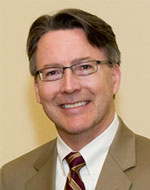 Timothy D. Sands served as executive vice president for academic affairs and provost with a faculty appointment as the Basil S. Turner Professor of Engineering in the schools of materials engineering and electrical and computer engineering. As provost, Sands led efforts to elevate student success to enhance retention and graduation rates. He initiated a move toward year-round use of facilities, led the development of the university's first comprehensive assessment of all degree-granting programs, and launched an online teaching and learning platform that emphasizes interactive, computation- and simulation-rich learning environments. Sands also led a study to develop a 10-year funding forecast for the University. While Purdue awaited the arrival of its 12th President, Mitchell E. Daniels Jr., the Board of Trustees named Sands acting president, a position he held from July 16, 2012, to January 14, 2013. Prior to becoming provost, Sands served from 2006-10 as the Mary Jo and Robert L. Kirk Director of the Birck Nanotechnology Center in Purdue's Discovery Park. From 1993-2002, Sands was a professor of materials science and engineering at the University of California-Berkeley and prior to that, he conducted research and directed research groups at Bellcore, a New Jersey-based research company now known as Telcordia. Sands earned a bachelor's degree with highest honors in engineering physics, and a master's degree and a PhD in materials science from the University of California, Berkeley.
Timothy D. Sands served as executive vice president for academic affairs and provost with a faculty appointment as the Basil S. Turner Professor of Engineering in the schools of materials engineering and electrical and computer engineering. As provost, Sands led efforts to elevate student success to enhance retention and graduation rates. He initiated a move toward year-round use of facilities, led the development of the university's first comprehensive assessment of all degree-granting programs, and launched an online teaching and learning platform that emphasizes interactive, computation- and simulation-rich learning environments. Sands also led a study to develop a 10-year funding forecast for the University. While Purdue awaited the arrival of its 12th President, Mitchell E. Daniels Jr., the Board of Trustees named Sands acting president, a position he held from July 16, 2012, to January 14, 2013. Prior to becoming provost, Sands served from 2006-10 as the Mary Jo and Robert L. Kirk Director of the Birck Nanotechnology Center in Purdue's Discovery Park. From 1993-2002, Sands was a professor of materials science and engineering at the University of California-Berkeley and prior to that, he conducted research and directed research groups at Bellcore, a New Jersey-based research company now known as Telcordia. Sands earned a bachelor's degree with highest honors in engineering physics, and a master's degree and a PhD in materials science from the University of California, Berkeley.
2008-2010: William “Randy” Woodson
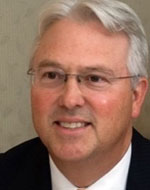 William “Randy” Woodson served as executive vice president for academic affairs and provost with a faculty appointment as professor in the Department of Horticulture and Landscape Architecture. During his tenure as provost, Woodson oversaw the development and implementation of Purdue’s New Synergies strategic plan focused on launching tomorrow’s leaders, promoting discovery with delivery, and meeting global challenges. He championed and supported many significant Purdue initiatives, including increased student retention, new degree programs, and the hiring and retention of outstanding faculty and deans. Woodson was instrumental in the formation of the College of Health and Human Sciences. The new College was created through the realignment of nine academic units spread across three colleges. Prior to being named provost, Woodson served as the Glenn W. Sample Dean of Agriculture from 2004-08. As dean, he led the college’s effort to hire more than 100 new faculty, and partnered with the College of Science to launch the Climate Change Research Center. Woodson also created the college’s Office of Multicultural Programs. Woodson was associate dean of agriculture and director of agricultural research programs from 1998-2004. He also was head of Purdue’s Department of Horticulture and Landscape Architecture from 1996-98, and director of Purdue’s plant biology program from 1995-97. Woodson earned his master’s degree in horticulture and PhD in horticulture and plant physiology, both from Cornell University, and his bachelor’s degree in horticulture from the University of Arkansas.
William “Randy” Woodson served as executive vice president for academic affairs and provost with a faculty appointment as professor in the Department of Horticulture and Landscape Architecture. During his tenure as provost, Woodson oversaw the development and implementation of Purdue’s New Synergies strategic plan focused on launching tomorrow’s leaders, promoting discovery with delivery, and meeting global challenges. He championed and supported many significant Purdue initiatives, including increased student retention, new degree programs, and the hiring and retention of outstanding faculty and deans. Woodson was instrumental in the formation of the College of Health and Human Sciences. The new College was created through the realignment of nine academic units spread across three colleges. Prior to being named provost, Woodson served as the Glenn W. Sample Dean of Agriculture from 2004-08. As dean, he led the college’s effort to hire more than 100 new faculty, and partnered with the College of Science to launch the Climate Change Research Center. Woodson also created the college’s Office of Multicultural Programs. Woodson was associate dean of agriculture and director of agricultural research programs from 1998-2004. He also was head of Purdue’s Department of Horticulture and Landscape Architecture from 1996-98, and director of Purdue’s plant biology program from 1995-97. Woodson earned his master’s degree in horticulture and PhD in horticulture and plant physiology, both from Cornell University, and his bachelor’s degree in horticulture from the University of Arkansas.
2001-2007: Sally Frost Mason
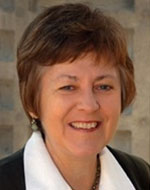 Sally Frost Mason served as provost with a faculty appointment as professor of biological sciences. During her time as provost, Frost Mason successfully managed the academic initiatives associated with implementation of Purdue’s strategic plan emphasizing “preeminence” through learning, discovery and engagement. She led the initiative to design and staff programs in Discovery Park, and also oversaw Purdue’s conversion to the OnePurdue and Banner database systems. She supported a faculty initiative in the College of Engineering to shift to an interdisciplinary approach to teaching and research. Frost Mason brought diversity awareness to Purdue faculty through ongoing workshops, which also included gender awareness training. These events became known as “multicultural forums,” which gave rise to the Diversity Leadership Group. Mason also initiated the Women in Philanthropy group. Prior to joining Purdue, Mason was a faculty member at the University of Kansas and was dean of the College of Liberal Arts and Sciences, until her appointment as Purdue’s provost. Mason earned her master’s degree in developmental biology from Purdue, her PhD in cellular, molecular, and developmental biology from the University of Arizona, and her bachelor’s degree in zoology at the University of Kentucky.
Sally Frost Mason served as provost with a faculty appointment as professor of biological sciences. During her time as provost, Frost Mason successfully managed the academic initiatives associated with implementation of Purdue’s strategic plan emphasizing “preeminence” through learning, discovery and engagement. She led the initiative to design and staff programs in Discovery Park, and also oversaw Purdue’s conversion to the OnePurdue and Banner database systems. She supported a faculty initiative in the College of Engineering to shift to an interdisciplinary approach to teaching and research. Frost Mason brought diversity awareness to Purdue faculty through ongoing workshops, which also included gender awareness training. These events became known as “multicultural forums,” which gave rise to the Diversity Leadership Group. Mason also initiated the Women in Philanthropy group. Prior to joining Purdue, Mason was a faculty member at the University of Kansas and was dean of the College of Liberal Arts and Sciences, until her appointment as Purdue’s provost. Mason earned her master’s degree in developmental biology from Purdue, her PhD in cellular, molecular, and developmental biology from the University of Arizona, and her bachelor’s degree in zoology at the University of Kentucky.
1991-2001: Robert L. Ringel
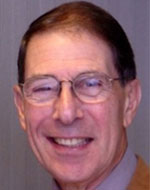 Robert L. Ringel served as executive vice president for academic affairs with a faculty appointment in the Department of Audiology and Speech Sciences. Ringel held a range of administrative positions at Purdue, where he set new standards of excellence. A number of programs developed under his supervision received affirmative action awards including Purdue’s Historically Black Institution Visitation Program; Spousal Employment Opportunity; Minority Bridge Program; Tenure Probation Period Extension; and Spousal Relocation Effort. During his tenure at Purdue, he served as head of the Department of Audiology and Speech Sciences, 1970-1973; dean of the School Humanities, Social Science and Education, 1973-1986; vice president for research and dean of the Graduate School, 1986-1990; and executive vice president for academic affairs, 1991-2001. In 1998, he was named the Donald S. Powers Distinguished University Administrator, the only administrator at the time to receive this recognition at Purdue. Ringel also was devoted to the arts as was evident in his advocacy for the creation of permanent galleries at the university, which it had not had up to that time. The gallery that bears his name is located in Stewart Center. Ringel received his master's degree in audiology and speech science, his PhD in speech science and speech pathology, both from Purdue, and his bachelor’s degree from Brooklyn College.
Robert L. Ringel served as executive vice president for academic affairs with a faculty appointment in the Department of Audiology and Speech Sciences. Ringel held a range of administrative positions at Purdue, where he set new standards of excellence. A number of programs developed under his supervision received affirmative action awards including Purdue’s Historically Black Institution Visitation Program; Spousal Employment Opportunity; Minority Bridge Program; Tenure Probation Period Extension; and Spousal Relocation Effort. During his tenure at Purdue, he served as head of the Department of Audiology and Speech Sciences, 1970-1973; dean of the School Humanities, Social Science and Education, 1973-1986; vice president for research and dean of the Graduate School, 1986-1990; and executive vice president for academic affairs, 1991-2001. In 1998, he was named the Donald S. Powers Distinguished University Administrator, the only administrator at the time to receive this recognition at Purdue. Ringel also was devoted to the arts as was evident in his advocacy for the creation of permanent galleries at the university, which it had not had up to that time. The gallery that bears his name is located in Stewart Center. Ringel received his master's degree in audiology and speech science, his PhD in speech science and speech pathology, both from Purdue, and his bachelor’s degree from Brooklyn College.
1986-1990: Varro E. Tyler
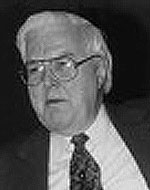 Varro E. Tyler served as executive vice president for academic affairs with a faculty appointment as professor of pharmacognosy – the study of medical drugs obtained from plants, animals, and microbes. Tyler joined Purdue's faculty in 1966, serving as dean of the School of Pharmacy and Pharmacal Sciences until his promotion in 1979 to dean of the Schools of Pharmacy, Nursing and Health Sciences. In 1986, he became executive vice president for academic affairs of the University. In 1991, he returned to the School of Pharmacy as the Lilly Distinguished Professor in Pharmacognosy until retiring in 1996 as dean and Distinguished Professor of Pharmacognosy Emeritus. Tyler remained active in Purdue affairs and helped organize the new Center for Botanical Research funded by the National Center for Complementary and Alternative Medicine at the National Institutes of Health. Tyler served his profession as first president of the American Society of Pharmacognosy (1959-61) as well as president of the American Association of Colleges of Pharmacy (1970-71) and the Institute of the History of Pharmacy (1993-95). In 1972, he became a director of the American Council on Pharmaceutical Education and, in 1974, attained the distinction of becoming the first educator elected president of that group. Tyler received his master’s and doctorate degrees from the University of Connecticut, and his bachelor’s degree from the University of Nebraska.
Varro E. Tyler served as executive vice president for academic affairs with a faculty appointment as professor of pharmacognosy – the study of medical drugs obtained from plants, animals, and microbes. Tyler joined Purdue's faculty in 1966, serving as dean of the School of Pharmacy and Pharmacal Sciences until his promotion in 1979 to dean of the Schools of Pharmacy, Nursing and Health Sciences. In 1986, he became executive vice president for academic affairs of the University. In 1991, he returned to the School of Pharmacy as the Lilly Distinguished Professor in Pharmacognosy until retiring in 1996 as dean and Distinguished Professor of Pharmacognosy Emeritus. Tyler remained active in Purdue affairs and helped organize the new Center for Botanical Research funded by the National Center for Complementary and Alternative Medicine at the National Institutes of Health. Tyler served his profession as first president of the American Society of Pharmacognosy (1959-61) as well as president of the American Association of Colleges of Pharmacy (1970-71) and the Institute of the History of Pharmacy (1993-95). In 1972, he became a director of the American Council on Pharmaceutical Education and, in 1974, attained the distinction of becoming the first educator elected president of that group. Tyler received his master’s and doctorate degrees from the University of Connecticut, and his bachelor’s degree from the University of Nebraska.
1974-1986: Felix Haas
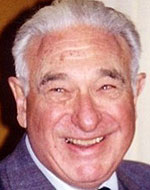 Felix Haas served as executive vice president and provost. Haas served Purdue for more than 40 years as a professor, head of the Division of Mathematical Sciences, the first dean of the School of Science, and provost. Among his many significant contributions to Purdue, Haas developed the Department of Computer Science, and was involved with the establishment of the Department of Statistics and what is now known as the Department of Earth, Atmospheric and Planetary Sciences. In spring 1961, Haas was hired by Purdue to head the Division of Mathematical Sciences, which included the Mathematics Department and the Statistical Laboratory, which was in charge of the university's data processing operation. Haas soon recommended that the division be restructured into three academic departments—Computer Science, Mathematics, and Statistics—as well as two service units, the Statistical Laboratory and the newly created Purdue Computing Center. Through this move, Haas made high-level computing available to faculty to aid in research and to attract top professors. In December 1962, Haas was asked to lead the newly created School of Science. He served as dean of the School of Science until 1974 and became Purdue's executive vice president and provost in 1974, a position he held until he reached the mandatory retirement age of 65 for senior administrators. Although he formally retired from the university in 1991, he maintained an office and regularly taught an undergraduate course until 2005. In 2006, Purdue’s Board of Trustees voted to rename the former Computer Science Building "Felix Haas Hall," in recognition of his vision and leadership in creating the first Computer Science Department in the U.S. Haas earned his bachelor’s, master’s and PhD degrees from Massachusetts Institute Technology.
Felix Haas served as executive vice president and provost. Haas served Purdue for more than 40 years as a professor, head of the Division of Mathematical Sciences, the first dean of the School of Science, and provost. Among his many significant contributions to Purdue, Haas developed the Department of Computer Science, and was involved with the establishment of the Department of Statistics and what is now known as the Department of Earth, Atmospheric and Planetary Sciences. In spring 1961, Haas was hired by Purdue to head the Division of Mathematical Sciences, which included the Mathematics Department and the Statistical Laboratory, which was in charge of the university's data processing operation. Haas soon recommended that the division be restructured into three academic departments—Computer Science, Mathematics, and Statistics—as well as two service units, the Statistical Laboratory and the newly created Purdue Computing Center. Through this move, Haas made high-level computing available to faculty to aid in research and to attract top professors. In December 1962, Haas was asked to lead the newly created School of Science. He served as dean of the School of Science until 1974 and became Purdue's executive vice president and provost in 1974, a position he held until he reached the mandatory retirement age of 65 for senior administrators. Although he formally retired from the university in 1991, he maintained an office and regularly taught an undergraduate course until 2005. In 2006, Purdue’s Board of Trustees voted to rename the former Computer Science Building "Felix Haas Hall," in recognition of his vision and leadership in creating the first Computer Science Department in the U.S. Haas earned his bachelor’s, master’s and PhD degrees from Massachusetts Institute Technology.
1971-1974: Harold F. Robinson
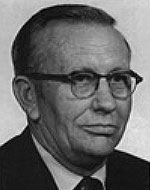 Harold Frank Robinson became the first to hold the position of provost, which was created by Purdue President Arthur G. Hansen. During his years at Purdue, Robinson was instrumental in helping President Hansen design and develop a new central administrative structure, while providing academic leadership to the University. He was recognized for his strong leadership in the organizational, financial and academic policy areas during the early 1970s. Robinson brought to Purdue a rich background of academic and administrative experience, having served at various times at North Carolina State University as professor of statistics, and head of the Department of Genetics; as director of the Institute of Biological Sciences; as assistant director of the Experiment Station; as administrative dean for research; and later, in the State of Georgia, as Vice Chancellor for the University System. Robinson also served as the Executive Director of President Lyndon B. Johnson's Science Advisory Committee Panel on the World Food Supply from 1966 to 1967. Robinson earned his bachelor’s and master’s degrees from North Carolina State College and earned a doctorate in genetics and plant breeding from the University of Nebraska.
Harold Frank Robinson became the first to hold the position of provost, which was created by Purdue President Arthur G. Hansen. During his years at Purdue, Robinson was instrumental in helping President Hansen design and develop a new central administrative structure, while providing academic leadership to the University. He was recognized for his strong leadership in the organizational, financial and academic policy areas during the early 1970s. Robinson brought to Purdue a rich background of academic and administrative experience, having served at various times at North Carolina State University as professor of statistics, and head of the Department of Genetics; as director of the Institute of Biological Sciences; as assistant director of the Experiment Station; as administrative dean for research; and later, in the State of Georgia, as Vice Chancellor for the University System. Robinson also served as the Executive Director of President Lyndon B. Johnson's Science Advisory Committee Panel on the World Food Supply from 1966 to 1967. Robinson earned his bachelor’s and master’s degrees from North Carolina State College and earned a doctorate in genetics and plant breeding from the University of Nebraska.
1967-1971: George A. Hawkins
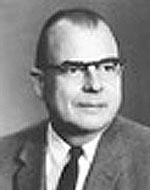 George Andrew Hawkins served as vice president for academic affairs with a faculty appointment as the Westinghouse Research Professor of Heat Transfer, the first named professorship at Purdue University (awarded in 1943). Hawkins served Purdue for more than 40 years in teaching, research and administration, beginning as an instructor in 1932, and attaining his full professorship in 1942. He served as assistant dean of the graduate school from 1947 to 1959 and acting dean from 1949 to 1950. He became dean of the Schools of Engineering and director of the Engineering Experiment Station in 1953 and in 1967. Hawkins was president of the American Society for Engineering Education from 1970-71. In addition, he served as president of McClure Park, Inc., Purdue's Industrial Research Park. When Hawkins retired, Purdue’s Board of Trustees acknowledged his “magnificent contributions to the institution, the profession of engineering, the state and national economy, and to human technical civilization.” A slide rule that belonged to George Hawkins was included among the items buried in a time capsule, sealed in 2011, near the entrance of the Roger B. Gatewood Wing of the Mechanical Engineering Building – it will be opened in 2061. Hawkins earned his Bachelor of Science, master's and PhD degrees, all in mechanical engineering, and all from Purdue University.
George Andrew Hawkins served as vice president for academic affairs with a faculty appointment as the Westinghouse Research Professor of Heat Transfer, the first named professorship at Purdue University (awarded in 1943). Hawkins served Purdue for more than 40 years in teaching, research and administration, beginning as an instructor in 1932, and attaining his full professorship in 1942. He served as assistant dean of the graduate school from 1947 to 1959 and acting dean from 1949 to 1950. He became dean of the Schools of Engineering and director of the Engineering Experiment Station in 1953 and in 1967. Hawkins was president of the American Society for Engineering Education from 1970-71. In addition, he served as president of McClure Park, Inc., Purdue's Industrial Research Park. When Hawkins retired, Purdue’s Board of Trustees acknowledged his “magnificent contributions to the institution, the profession of engineering, the state and national economy, and to human technical civilization.” A slide rule that belonged to George Hawkins was included among the items buried in a time capsule, sealed in 2011, near the entrance of the Roger B. Gatewood Wing of the Mechanical Engineering Building – it will be opened in 2061. Hawkins earned his Bachelor of Science, master's and PhD degrees, all in mechanical engineering, and all from Purdue University.
1961-1967: Paul F. Chenea
 Paul F. Chenea served as the first vice president for academic affairs, a new position established by President Frederick L. Hovde. In this role, Chenea assisted and acted on behalf of the President in the planning, organization and development of the academic programs of the University. Chenea was involved in the selection and promotion of faculty, supervised the university libraries, guided the audiovisual center, and oversaw the development of Purdue's microwave television facilities. During the 1962-63 academic year, he also was acting dean of the School of Science, Education and Humanities. Chenea enjoyed a distinguished academic career, participating on many national committees, often as chairman. Among the organizations he served were the American Society for Engineering Education, the National Science Foundation, the American Society of Civil Engineers, and the National Research Council. He also was a consultant to various government and industrial organizations. Chenea earned his Bachelor of Science degree in civil engineering from the University of California, and his master’s and PhD in engineering mechanics, both from the University of Michigan.
Paul F. Chenea served as the first vice president for academic affairs, a new position established by President Frederick L. Hovde. In this role, Chenea assisted and acted on behalf of the President in the planning, organization and development of the academic programs of the University. Chenea was involved in the selection and promotion of faculty, supervised the university libraries, guided the audiovisual center, and oversaw the development of Purdue's microwave television facilities. During the 1962-63 academic year, he also was acting dean of the School of Science, Education and Humanities. Chenea enjoyed a distinguished academic career, participating on many national committees, often as chairman. Among the organizations he served were the American Society for Engineering Education, the National Science Foundation, the American Society of Civil Engineers, and the National Research Council. He also was a consultant to various government and industrial organizations. Chenea earned his Bachelor of Science degree in civil engineering from the University of California, and his master’s and PhD in engineering mechanics, both from the University of Michigan.
